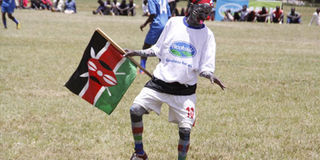Hunger for trophies: Schools hire outsiders to win competitions

Football fan Isaac Juma entertains the crowd during a quarter-final match between Barding High School from Kenya and College Gisenyi Secondary School from Rwanda, at the Brookside East Africa Secondary School Games at Eldoret Sports Club on September 1, 2016. PHOTO | JARED NYATAYA |
What you need to know:
- Primary and secondary school games have over the years given rise to some of the country’s greatest sporting stars.
- Investigations show that the cheating and forgery starts right from the zonal level to the East African level.
A well-coordinated scam in which ‘mercenaries’ are playing in primary and secondary school games can be revealed today.
Saturday Nation has established that the games, which are meant for school children, have over the years been infiltrated by overage professional players and non-students.
Principals and teachers have gone to a huge extent to ensure their schools win at all costs.
The scheme has roped in education officials who bend the rules for their cronies and allow them to have undue advantage at the games – for a reward.
SPORTING STARS
The corruption, investigations further reveal, extends to music and drama festivals where teachers buy scripts from professional playwrights and even incorporate the key cast from established acting groups.
Primary and secondary school games have over the years given rise to some of the country’s greatest sporting stars.
Harambee Stars captain and Tottenham Hotspur midfielder Victor Wanyama, World Rugby Sevens Series all-time scorer Collins Injera and his elder brother Humphrey Kayange, as well as celebrated volleyball setter Janet Wanja, are some of the big names that have risen through these games.
But the hope of many other students emulating these stars and rising through school games mentorship are being dashed by this institutionalised corruption, which is driven by their own teachers.
According to the Education ministry and Kenya Secondary Schools Sports Association (KSSSA) – the body that organises secondary school games - the competitions are bound by rules, key among them touching on age-cheating and impersonation.
For instance, all players in the secondary school games must be below 19 years, and provide proof of being a student of the school he or she represents.
WHATEVER IT TAKES
Some of these rules were enforced to offer a level playing ground.
But teachers go around these rules by forging birth and primary school final examination certificates and student identity cards to prove they are presenting ‘genuine’ students when in fact they are villagers and club players.
This is done with the express blessing of head teachers who collude with games officials.
Investigations show that the cheating and forgery starts right from the zonal level to the East African level, where Kenyan schools battle with their neighbours for honours in various disciplines.
Kenya retained the overall title at the regional showpiece but the victory was marred with reports that the home side had fielded ineligible players.
Several teachers, who spoke to Saturday Nation on condition of anonymity for fear of victimisation, admitted that cheating is the norm and on that occasion the sports association encouraged it to ensure Kenya won.
CHEATING
One teacher revealed that they were briefed before the tournament and told to do everything possible to ensure Kenya won.
“We were allowed to have three non-students in all our teams and this has been happening for many years,” the teacher said.
Another teacher added: “Kenyans had to device a way to ensure they match them, hence cheating and sadly, this starts from the zonal level.
"The competition has become so intense even between the Kenyan teams and the stakes are high.”
Schools are also said to be recycling former students as well as poaching players from clubs, estates, colleges and universities.
“These ‘players’ are thus armed with basic knowledge about the schools, such as the names of ‘their teachers and classes’. The ‘students’ are drilled to behave as such,” Mr Joseph Odero, a teacher from Khayega in Kakamega, told Saturday Nation.
AGENCY DENIES CLAIMS
On Friday, Education Cabinet Secretary Fred Matiang’i put county officials on notice, saying they would be the first to be punished if fraud was detected in their regions.
“Those games and festivals should be supervised. They are not happening on autopilot. The guidelines are very clear. In fact, we already punished one head teacher end of last year,” Dr Matiang’i said.
He said the co-curricular activities are meant to develop children’s skills and talents and not merely for trophies.
Confronted with the reports, KSSSA secretary-general David Ngugi was adamant that the association had done its bit to crack the whip on the vice.
“Some of the cases are never reported and so we cannot follow up on them but we are trying hard to ensure we run a clean sport,” he said on Friday.
NORMALISED
Accusations have also been levelled against a cartel within the association which changed its constitution to scrap term limits.
When asked about these claims, Mr Ngugi said the body is run professionally.
Mr Aghan Odero, a thespian and a former director of the Kenya Cultural Centre, said the hiring of outsiders to write and direct plays for school children has become normalised.
“It has been going on for more than 20 years now,” Mr Aghan said, explaining that it was the hunger for success that led schools to engage in the vice.
The pressure to win is so high that some teachers have moved to court to have a decision against their teams overturned.





